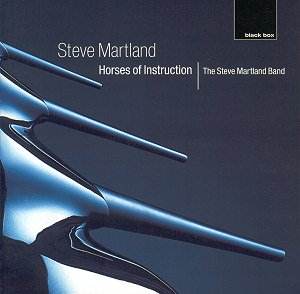Steve Martland is one of the more interesting characters
around the current UK music scene. He stands apart from more ‘establishment’
figures like Adès or Turnage, with their comparatively conventional
output, and instead gives us something which hovers disconcertingly
between Minimalism, Jazz and Rock – and yet is none of those. His music,
it seems to me, has a lot in common with figures such as Louis Andriessen
in Holland, or Michael Torke in the US, both as hard to classify as
Martland himself.
This CD gives an extremely good impression of his output.
It also celebrates the brilliance of the ‘band’ that he has put together
to perform his and others’ music. It mixes brass and saxophones with
percussion, guitars and keyboard, with the occasional telling contribution
from the violin of Chris Tombing.
Horses of Instruction, the first track, is both
the longest and one of the most complex numbers here. It’s also probably
the most ‘minimalist’ in that it owes much to the chugging rhythms and
tuned percussion of Steve Reich. But Martland allows the texture, tempo
and rhythm to change enough to avoid the ennui that can descend during
even the most artful piece of Reich, and which is never far away (for
me at least) in any piece of, for example, Michael Nyman. The title,
by the way, comes from William Blake, who has been a recurring source
of inspiration for Martland.
Track 2, Kick, is quite different, and shows
him using folk influences. Chris Tombing is featured, presenting an
anonymous folk fiddle melody from the 17th century. After
a more fragmented, rock influenced middle section, the folk melody returns
in a wild transformation for the whole band – bracing!
I suggested Martland was not an ‘establishment’ figure;
well this is true, yet he does get commissions from that bastion of
the musical establishment, the BBC. (I suppose that it’s a tribute to
Martland that he presents a just about equally awkward problem for Radio
3 and Classic FM!). Such was the origin of the piece on track 3, Beat
the Retreat, for which he seizes on a bass line by Purcell, and
effectively uses it as a ‘ground’. What he comes up with, though, is
unlike any Chaconne or Passacaglia I’d ever heard. It’s a sign of real
creative talent to be able to re-invent a traditional form in such a
diverting way. Peter Maxwell Davies did something a little similar in
Farewell to Stromness, but the delicious bluesy element in the
harmony gives this music a distinctive flavour.
After the fairly frenetic quality of these first three
tracks, the gently elegiac character of Mr. Anderson’s Pavane (written
as a homage to the late Lindsay Anderson, film director) comes
as a welcome contrast. Principia, track 5, is probably Martland’s
most familiar work, having been used by Radio 3 as the title music for
the programme ‘The Music Machine’. Thistle of Scotland, the shortest
piece on the CD, has much in common with Kick, taking a Scottish
folk melody as its basis.
Eternal Delight is another Blake reference ("Energy
is Eternal Delight"), and is probably the most structurally complex
piece here. The composer even uses the word ‘symphonic’ in his booklet
notes, which is a bit of a surprise! But he’s right – there is a symphonic
feel to the way the material is developed and eventually recapitulated
in a summative way.
The programme is completed by the hilariously bustling
Re-Mix, based on a repeated three-note riff or ostinato, and
Terminal, originally conceived as a collaboration between Martland
and the rock band ‘Spiritualised’. This is an exciting and provocative
CD; as Martland suggests in his booklet notes, the performers have managed
to reproduce in the studio the manic energy that characterises their
concert appearances, which is quite an achievement – great fun and well
worth a hearing, even if you object to Martland’s dress(or undress)
sense.
Gwyn Parry-Jones


